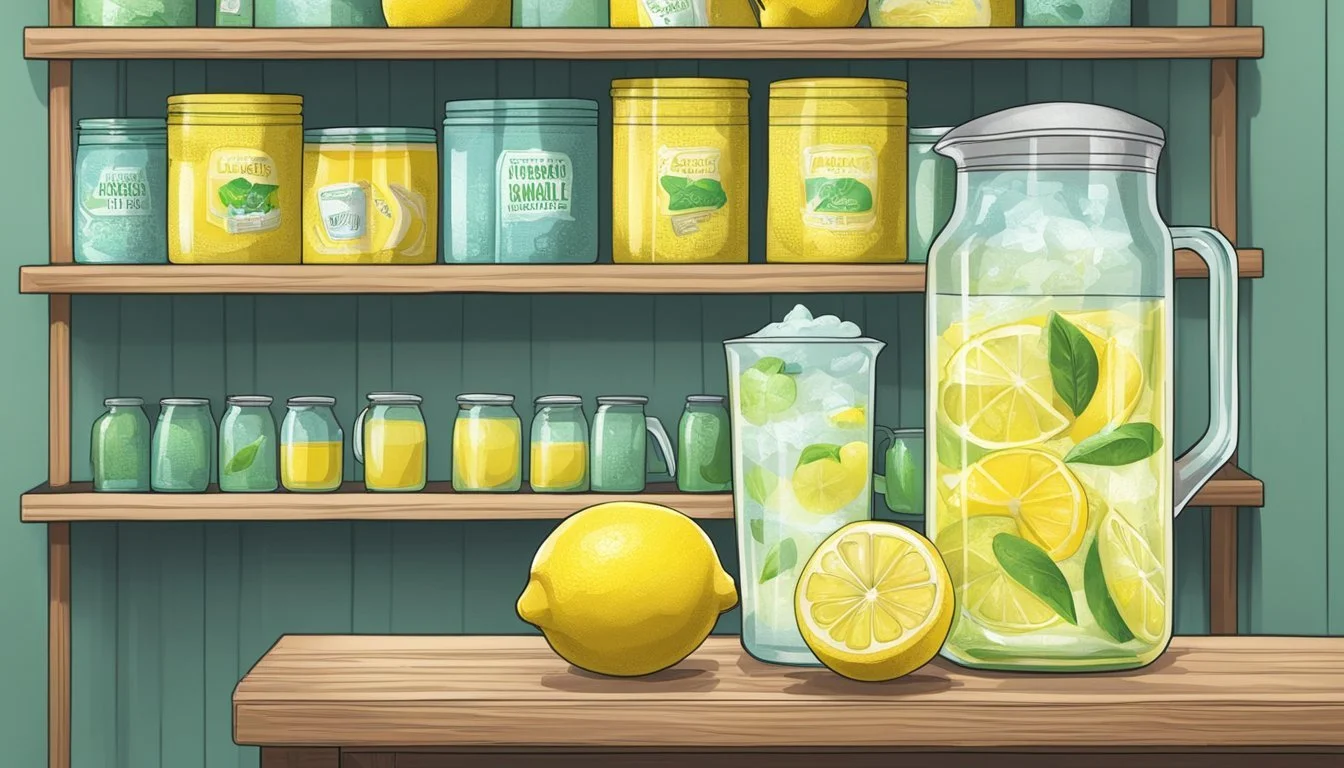How Long Does Freshly Squeezed Lemonade Last?
Shelf Life and Storage Tips
Freshly squeezed lemonade offers a refreshing, tangy taste that is a hallmark of summer and resonates with the joy of simpler times. Its flavor is derived from the natural goodness of lemons, which are rich in vitamin C. When making homemade lemonade, the longevity of its freshness is a pressing question for enthusiasts looking to savor every sip. The shelf life of lemonade is determined by several factors, such as the preparation method, ingredients used, and the manner in which the beverage is stored.
Homemade lemonade, made with freshly squeezed lemon juice, sugar, and water, does not contain the preservatives found in commercially-produced drinks. As a result, its freshness is fleeting. Typically, lemonade should be consumed within 2 to 4 days when stored in a refrigerator at a consistent temperature. Ensuring the lemonade is kept in a tightly sealed container can help maintain its quality and extend its enjoyment a bit longer.
Freezing is another option for prolonging the life of lemonade, transforming it into a treat that can last for several months. By pouring the beverage into ice cube trays or airtight containers and leaving some space to accommodate expansion, frozen lemonade can retain its fresh flavor for up to three months. Whether refrigerated or frozen, it is essential to note that the quality of the lemonade may change over time, affecting aspects such as taste and aroma.
Understanding Lemonade Shelf Life
Freshly squeezed lemonade offers a refreshing taste but understanding its shelf life is crucial to ensure both flavor and safety.
Factors Affecting Freshness
Freshly squeezed lemon juice, as the primary ingredient in lemonade, is sensitive to several factors:
Temperature: Lemonade should be refrigerated to maintain freshness. At room temperature, it remains fresh for up to 2 hours. In the fridge, its shelf life extends to 5-7 days.
Storage: A tightly sealed container is essential to prevent exposure to air and contaminants.
Freezing: When frozen, lemonade can retain its quality for two to three months.
Condition Shelf Life Room Temperature Up to 2 hours Refrigerated 5-7 days Frozen 2-3 months
Signs of Spoilage
To determine if lemonade has gone bad, one should look for:
Smell: An off odor is a primary indicator of spoilage.
Appearance: Changes in color or texture, such as cloudiness or sediment, can signal degradation.
Mold: Any visible mold growth is a clear sign that the lemonade is no longer safe to consume.
Storage Best Practices
To ensure the longevity and freshness of freshly squeezed lemonade, one must adhere to specific storage methods. Refrigeration, freezing, and even room temperature storage play significant roles in maintaining the beverage's quality.
Refrigerating Fresh Lemonade
When refrigerating fresh lemonade, it is vital to store it in an airtight container to prevent the introduction of odors and inhibit bacterial growth. Fresh lemonade should be refrigerated promptly and consumed within 5 to 7 days to maintain its optimal taste and quality.
Freezing Lemonade
For extended preservation, freezing fresh lemonade is an excellent option. Pour lemonade into ice cube trays or an airtight container suitable for the freezer, which can substantially extend the shelf life up to 6 months. Thawed lemonade should be consumed relatively quickly, as it does not have preservatives to prevent spoilage after defrosting.
Storing At Room Temperature
Fresh lemonade should not be left at room temperature for extended periods. Ideally, it should only remain out of the refrigerator for up to 2 hours. For unopened, commercially bottled lemonade, storing it in a cool, dark place such as a pantry is acceptable. Once opened, it must be refrigerated and treated like fresh lemonade.
Making Homemade Lemonade
Making homemade lemonade is a simple process involving just three key ingredients - lemons, sugar, and water. When combined, they create a refreshing drink with a perfect balance of sweetness and tang.
Choosing Ingredients
For the best-tasting lemonade, one should select fresh, ripe lemons. They yield the most juice and impart a bright, zesty flavor. Granulated sugar is commonly used to sweeten lemonade, but some opt for simple syrup for an even blend. Fresh, clean water is essential, as it makes up the majority of the beverage.
Preparation Techniques
The creation of lemonade primarily involves extracting juice from lemons and dissolving sugar. Many use a juicer to efficiently get lemon juice, while others prefer the manual approach, using a reamer or citrus press. To ensure sweetness is uniformly dispersed, preparing simple syrup by dissolving sugar in hot water is a recommended step.
Homemade Lemonade Recipe
Below is a straightforward homemade lemonade recipe using fresh ingredients:
Ingredients:
1 cup fresh-squeezed lemon juice (about 4-6 medium lemons)
1 cup granulated sugar
5 cups cold water
Ice (optional)
Lemon slices (for garnish)
Instructions:
Prepare the simple syrup by combining the granulated sugar with 1 cup of water in a saucepan. Heat until the sugar completely dissolves, then cool.
Juice the lemons to make 1 cup of lemon juice. Strain through a fine-mesh sieve if preferred.
In a pitcher, combine the cooled simple syrup, lemon juice, and the remaining 4 cups of water.
Stir well and refrigerate until cold. Serve with ice and garnish with lemon slices.
With these guidelines, one can make lemonade that boasts a homemade taste, far surpassing that of store-bought alternatives.
Nutritional Information
Freshly squeezed lemonade provides an array of nutritional benefits that vary depending on the ingredients used. Here is a breakdown of its nutritional content.
Caloric Content
The calorie count in freshly squeezed lemonade hinges on the amount of sugar added. Typically, one 8-ounce serving may contain:
Without added sugar: Approximately 6-10 calories
With sugar: Roughly 100-120 calories
Sugars and Sweetness
Sugar is the primary sweetening agent in lemonade and significantly impacts its sugar content. One serving of lemonade with added sugar might have:
Total Sugars: 24-30 grams, depending on the sweetness level.
Vitamins and Minerals
Lemonade made from fresh lemons is a good source of several vitamins and minerals, predominantly:
Vitamin C: About 20-25% of the daily value per serving
Potassium: Around 75-100 milligrams per serving
Other nutrients: Trace amounts of fiber, protein, and sodium, with negligible fat content.
Serving and Enjoyment
Proper serving enhances lemonade's refreshing and delicious qualities, making it a staple summer drink. The manner in which lemonade is served can significantly affect its enjoyment.
Serving Suggestions
To fully appreciate freshly squeezed lemonade's flavor and tartness, one should serve it chilled. Here are some tips:
Temperature: Always serve lemonade icy cold. This can be achieved by refrigerating the pitcher for at least an hour before serving or by using ice cubes.
Glassware: Use a clear glass to highlight the vibrant color of the lemonade. Serving in a glass rather than a plastic cup can enhance the overall drinking experience.
Accoutrements: Add a garnish to the glass, such as a lemon slice or a sprig of mint, to elevate the visual appeal and add a hint of extra flavor.
Water Quality: Utilize filtered water when preparing lemonade. This ensures that the flavor is not compromised by any impurities.
Creative Lemonade Variations
Experimenting with lemonade can lead to delightful variations that tantalize the taste buds. Here are some creative ideas:
Mixed Fruits: Infuse lemonade with other fruit juices, such as strawberry or blueberry, for a sweet twist.
Herbal Infusions: Incorporate herbs like basil or rosemary to introduce a complex, aromatic dimension to the traditional lemonade.
Sweetness Adjustments: Adjusting the sugar level can cater to different preferences for sweetness or tartness.
Sparkling Option: Substitute still water with sparkling water to add a fizzy sensation that enhances the refreshment factor.
Advance Preparation Tips
When seeking to enjoy the timeless refreshment of freshly squeezed lemonade, advance preparation can maintain its freshness and flavor. By focusing on successful batch making and proper storage techniques, one can ensure that this beverage remains a top pick for up to a week.
Making Lemonade in Large Batches
For those who wish to make lemonade ahead of time, it's essential to optimize the recipe for large batches. They should ensure that their yield matches the anticipated consumption to avoid waste and preserve quality. When preparing large quantities, consistency is key; each batch should taste as refreshing as the last. To facilitate this, individuals can create a concentrated lemon base—mixing freshly squeezed lemon juice with simple syrup—and then dilute it with the appropriate amount of water just before serving.
Key Steps for Large Batch Preparation:
Juice lemons to achieve the desired amount of lemon juice.
Create simple syrup and mix with the lemon juice to form a lemon concentrate.
Store the concentrate in the fridge and mix with cold water when ready to serve.
Storage Labels and Organization
Once lemonade is made, proper labeling and organization are crucial for maintaining its freshness. Labels and markers can be used to indicate the date the lemonade was made. This helps track how long the lemonade has been stored and ensures it is consumed within its optimal freshness period, typically five to seven days.
Storage Best Practices:
Use air-tight containers to store the lemonade, reducing exposure to air.
Clearly label containers with the date of preparation.
Organize the containers by date in the refrigerator to facilitate a first-in, first-out system.
By adhering to these tips, individuals can make the most of their homemade lemonade, always serving it at its best.
Health Considerations
When considering the health aspects of freshly squeezed lemonade, it is important to address the potential presence of allergens and the nutritional content, especially in terms of sugar and calories. These factors can significantly influence the dietary suitability of lemonade for various individuals.
Allergens and Dietary Restrictions
Freshly squeezed lemonade typically does not contain common allergens such as nuts, gluten, dairy, or shellfish, making it an inclusive beverage choice. However, individuals with citrus allergies should avoid lemonade, as lemons are the main ingredient. For those with dietary restrictions such as diabetes, monitoring the sugar content is crucial, as it can significantly impact blood glucose levels.
Balancing Sweetness with Nutrition
Lemonade's sweetness largely comes from added sugar, which can be high in calories and low in nutritional benefit. To make lemonade healthier, one might consider reducing the sugar amount or substituting with natural sweeteners like honey or stevia. Here is a brief overview of nutritional considerations:
Sweetener Type Calories (per tablespoon) Notes Granulated sugar ~49 High in calories, no nutrients. Honey ~64 Contains trace vitamins and minerals. Stevia ~0 No calories, sweeter than sugar.
Freshly squeezed lemonade provides vitamin C and hydration, but the nutritional benefit may be offset by high sugar content. Consumers should consider their nutritional needs and balance sweetness with those needs to enjoy lemonade as part of a healthy diet.
Lemonade Shelf Life FAQs
When considering the shelf life of freshly squeezed lemonade, factors such as storage conditions, the presence of preservatives, and temperature play crucial roles. Lemonade does indeed have a limited shelf life, and understanding how these factors influence longevity can ensure optimal freshness and safety.
Common Questions and Answers
How long does freshly squeezed lemonade last in the refrigerator?
Freshly squeezed lemonade typically lasts from 2 to 7 days in the refrigerator provided it is stored in a tightly sealed container to prevent exposure to air and bacteria growth.
Can lemonade go bad?
Yes, lemonade can go bad, as signs of spoilage include off smells, changes in color, or the appearance of mold. This is due to the degradation of ingredients and potential bacteria development.
What is the shelf life of lemonade in the freezer?
When frozen, lemonade can last 2 to 3 months. Using airtight containers or ice cube trays for freezing can help maintain its flavor.
Does fresh lemon juice extend the shelf life of lemonade?
While fresh lemon juice contains citric acid that has preservative qualities, it is not enough to significantly extend the shelf life of freshly squeezed lemonade beyond the typical refrigerator span.
How do preservatives affect lemonade’s shelf life?
Preservatives can extend the shelf life of lemonade, and commercially produced lemonades with preservatives may last longer than homemade versions. However, this article is focusing on freshly squeezed lemonade, which generally lacks additional preservatives.
Conclusion
Freshly squeezed lemonade has a limited shelf life due to its natural ingredients and absence of preservatives. Typically, one can expect homemade lemonade stored in the refrigerator to remain fresh for 5 to 7 days.
To maximize longevity, the lemonade should be kept in an airtight container and refrigerated immediately after being made. Signs that lemonade may have gone bad include off odors, a change in color, the presence of mold, or a fizzy taste indicating fermentation.
For those looking to preserve their lemonade for a longer period, freezing is a viable option. When frozen, lemonade can maintain its quality for up to 6 months. Freezing it in ice cube trays can provide convenient, single-serve portions.
Here's a quick reference to maintain the quality and safety of freshly squeezed lemonade:
Refrigerate promptly in an airtight container.
Consume within 5-7 days when stored in the fridge.
Look for signs of spoilage: off smell, color changes, or mold.
Freeze for extended storage, retaining quality for up to 6 months.
It is crucial to note that once lemonade is removed from refrigeration, it should be consumed within a few hours, as room temperature can accelerate spoilage.









